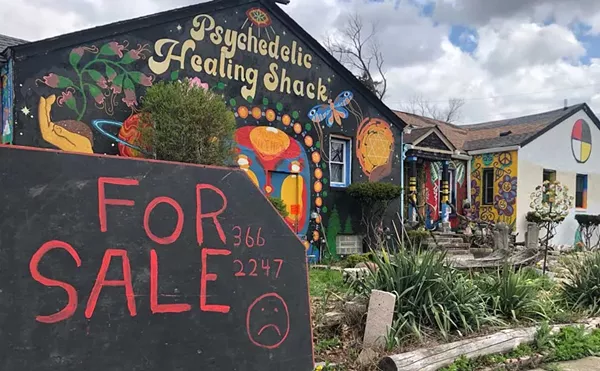State of emergency
Push for referendum on emergency manager law could halt EM appointments

Audio By Carbonatix
[
{
"name": "GPT - Leaderboard - Inline - Content",
"component": "35519556",
"insertPoint": "5th",
"startingPoint": "3",
"requiredCountToDisplay": "3",
"maxInsertions": 100,
"adList": [
{
"adPreset": "LeaderboardInline"
}
]
}
]
As our colleague Jack Lessenberry accurately predicted moths ago, the move to recall Michigan Gov. Rick Snyder is going nowhere. That is now official. However, the effort to overturn one of the key laws our nerd-in-chief pushed through the Legislature is going even better than expected.
Greg Bowens, spokesman for the coalition seeking to place a referendum to overturn the states new emergency manager law on the November 2012 ballot, says the effort to collect slightly more than 161,000 valid signatures could be wrapped up by early September, following what is expected to be a major push by volunteers over the Labor Day weekend.
"We expect to have the signatures collected by the time school starts," says Bowens, spokesman for the Stand Up for Democracy Campaign. "Things are going really good."
As of this week, close to 80,000 petitions were in circulation. The group is so confident it will collect far more than the number of signatures required to get on the ballot that the concern now is finding enough volunteers to go though the petitions and verify the names before they are handed into the state.
Bowens notes that qualifying the measure for the ballot is itself significant because, once state election officials validate the signatures, the law will be "frozen" until voters have a chance to give it a thumbs up or down.
"We wont be able to undo the damage thats been done so far," Bowens says, "but we can at least stop any more damage being done to democracy until people have the opportunity to vote on the measure."
And if that vote were to be held now, the law would easily be struck down, according to a survey recently taken by the polling firm EPIC/MRA. Based on a survey of 600 likely voters taken in early July, the law would be rejected by a margin of 53-34 percent, according to a report by the Gongwer News Service.
The law, which quickly sailed through the Republican-dominated Legislature after Snyder moved into the governors office earlier this year, greatly expands the powers given to emergency financial managers in 1990.
The change was made "in order to better equip [emergency managers] with the tools needed to address a local units financial emergency," according to information posted on the states website.
"Half of all jobs lost in the entire United State over the past decade were lost in Michigan. Dozens of local units of government are experiencing serious financial challenges. We are in a crisis."
The info then takes on an oddly political tone for an informational backgrounder like this, stating: "Some are spreading misinformation about the legislation and trying to use this to provoke the kind of fighting seen in Wisconsin."
Wisconsin is definitely a battleground state of sorts. Voters there rose up after its Republican-led Legislature and governor pushed through a law stripping public employee unions of their collective bargaining rights. The upshot there is that six Republicans and three Democrats are facing recall elections.
Rather than characterizing that upheaval as some sort of political boogeyman that we should be afraid of, supporters of the Michigan ballot measure see the Badger State as an example of the citizenry rising up in opposition to reactionary, right-wing policies.
"Whats going on in Wisconsin, the backlash against what the right is trying to do, has inspired other folks across the country," Bowens says.
Currently, four emergency managers have been installed in Michigan, including Detroit Public Schools emergency manager Roy Roberts.
Critics of the law say it places far too much power in the hands of one unelected person. Among other things, the coalition points out on its website, these managers have the authority to "seize and sell assets owned by the city, such as buildings or parks, without the approval of voters or elected officials." They can also "fire elected officials and dissolve or merge whole cities, counties and school districts."
The issue is getting national attention. The Michigan Messenger online newspaper reported last week that the members of the NAACP, during its national convention in Los Angeles last week, passed a resolution condemning such laws.
The site quoted the Rev. Wendell Anthony, president of the Detroit branch of the NAACP, as saying about the Michigan law, "We think that it attacks the voting rights of minorities and urban populations. "We are on the edge of the 2012 elections and this bill would allow the governor to eliminate the will of people by removing city councils, mayors and school boards."
Snyder has argued that, by making the potential for takeover more likely, local officials will be more motivated to quickly address financial shortfalls in order to keep from losing their power completely.
The Rev. David Bullock, president of the civil rights group Rainbow Push Detroit and a member of the Committee to Stand Up for Democracy, has a considerably different view.
"Emergency managers rule with impunity," he said in late July. "They make policy without regard to citizen input or local law. That is not democracy. That is a dictatorship, and it will not stand."





